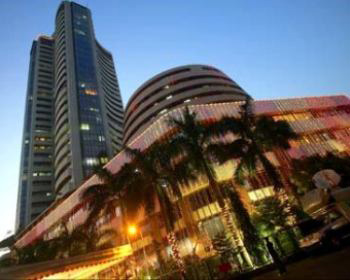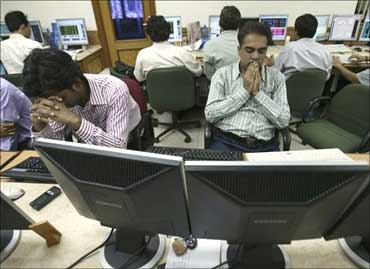BS Reporter in Mumbai
The markets plunged for the second consecutive session due to rising fears of an interest rate hike by the central bank to fight the soaring inflation and nervousness ahead of the Q3 quarterly earnings.
The Sensex ended at 19,224, lower by 467 points or 2.4% and the Nifty ended at 5,762, down 141 points, with realty and banking heavyweights facing the brunt of selling fury.
There was no place to hide in the broader market space either, with the midcap space ending at 7291, lower by 2.34% and the smallcap space ending at 9091, down 271 points.
The Reserve Bank of India Governor D Subbarao's statement over the weekend that the status quo on policy front at the last policy review should be interpreted only as a comma and not a full stop, seems to have further fuelled the existing fears of monetary tightening at the upcoming policy review meet.
The BSE Sensex had tumbled 817 points and the Nifty had tanked 229 points last week. In fact, the BSE benchmark has nosedived as much as 978 points in the last two trading sessions, qualifying as the largest 2-day fall in the last two years.
The BSE benchmark had shed 1200+ plus points in January 2009.
. . .
Why the Sensex crashed again
Image: The BSE traders.The markets were stable to begin with, on the back of steadiness on the global front and buying interest at lower levels post the carnage witnessed on Friday.
But bears soon sniffed out any faint hopes of a bounceback, hammering the Sensex to the lowest point of the session and nearly 600 points off the day's high.
The markets in Asia actually ended on an indecisive note; Hong Kong's Heng Seng index fell 0.7%, China's Shanghai Composite declined 1.7%, Straits Times and Seoul Composite were down 1% and 0.3% each, while Japan's Nikkei 225 was up 0.1% and Taiwan Weighted gained 0.4%.
According to analysts, the huge swings may provide good entry opportunities. Sankaran Naren CIO Equity, ICICI Prudential AMC said, 'equity markets in 2011 will be volatile and for investors, volatility will provide investment opportunities.' There are expectations that markets may continue to remain under pressure as valuations were over bought. Dilip Bhat, joint managing director, Prabhudas Lilladher said, "the Indian markets are in catch-22 situation where sudden gush of FII money has pulled the market in little over valued zone.. . .
Why the Sensex crashed again
The present valuations assumes that Indian will continue to grow at an upwards of 8-8.5 per cent, at the earnings growth in FY12 of around 20 per cent."
All the sectoral indices ended in the red. The banking index lost 3% at 12137 as prospects of an expected rate hike later this month saw no signs of abating. Sankaran Naren CIO Equity, ICICI Prudential AMC said in last six banks were fully valued and therefore we have trimmed our exposure to banking."
HDFC Bank lost 5% to emerge as the top loser on the Sensex. HDFC lost 4.4% at Rs 653, ICICI Bank lost 2.3% at Rs 1014 and SBI lost 2% at Rs 2547.
The realty index shed 3.5% to end the session at 2570. HDIL plunged by 7.8% at Rs 169 to be the top loser among the BSE Group A scrips.
IRB Infra lost 5.36% at Rs 209, IVRCL lost 5% at Rs 116, Unitech lost 3.4% at Rs 59 and Indiabulls Real Estate lost 3.3% at Rs 120. And index heavyweight RIL shed 3.1% at Rs 1031.
Infosys was the sole significant gainer ahead of its Q3 results to be announced on January 13. The IT bellweather gained Rs 30 or 0.9% at Rs 3396. And Bharti Airtel ended flat, with a positive bias, at Rs 338.
The market breadth was absymally poor, with the declines exceeding the advancing stocks in the ratio of 2:1.




article